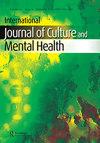Qualitative interviewing of Malay caregivers: stigma and mental health problems of older adults
Q1 Social Sciences
International Journal of Culture and Mental Health
Pub Date : 2017-04-03
DOI:10.1080/17542863.2016.1259338
引用次数: 7
Abstract
ABSTRACT In many cultures, diagnoses of mental illness are commonly associated with stigmatisation. Negative attitudes and beliefs cause significant problems not only for people with mental illness but also for their caregivers. Such attitudes and beliefs are embedded in cultural, religious and social contexts. It is important therefore to understand experiences of stigma in a range of contexts. This article reports on a qualitative study of the experiences of fourteen Malay caregivers’ of older people with a mental health problem in Kelantan, Malaysia. The in-depth interview data were analysed thematically. The impacts of stigma are reported in relation to caregivers’ life course opportunities; shame and embarrassment in a small community; a complex mix of understandings and the role of religion and culture in help-seeking behaviour. The challenges and ways forward to address this sensitive issue in this particular socio-cultural context are presented.马来照护者的质性访谈:老年人的污名与心理健康问题
在许多文化中,精神疾病的诊断通常与污名化有关。消极的态度和信念不仅会给精神疾病患者带来严重的问题,也会给他们的照顾者带来严重的问题。这种态度和信仰根植于文化、宗教和社会背景中。因此,重要的是要了解在各种情况下的耻辱经历。这篇文章报告了一个定性研究经验的14名马来人照顾者的老年人与精神健康问题在吉兰丹,马来西亚。对深度访谈数据进行主题分析。据报道,耻辱的影响与照顾者的生命历程机会有关;在一个小群体中感到羞耻和尴尬;在寻求帮助的行为中,宗教和文化的理解和作用是一个复杂的组合。在这种特殊的社会文化背景下,提出了解决这一敏感问题的挑战和方法。
本文章由计算机程序翻译,如有差异,请以英文原文为准。
求助全文
约1分钟内获得全文
求助全文
来源期刊

International Journal of Culture and Mental Health
Social Sciences-Cultural Studies
CiteScore
2.10
自引率
0.00%
发文量
0
期刊介绍:
This title has ceased (2018). This important peer-review journal provides an innovative forum, both international and multidisciplinary, for addressing cross-cultural issues and mental health. Culture as it comes to bear on mental health is a rapidly expanding area of inquiry and research within psychiatry and psychology, and other related fields such as social work, with important implications for practice in the global context. The journal is an essential resource for health care professionals working in the field of cross-cultural mental health.Readership includes psychiatrists, psychologists, medical anthropologists, medical sociologists, psychiatric nurses and social workers, general practitioners and other mental health professionals interested in the area. The International Journal of Culture and Mental Health publishes original empirical research, review papers and theoretical articles in the fields of cross-cultural psychiatry and psychology. Contributions from the fields of medical anthropology and medical sociology are particularly welcome. A continuing dialogue between members of various disciplines in various fields is encouraged. The aim of the journal is to encourage its readers to think about various issues which have clouded cross-cultural development of ideas. The journal lays special emphasis on developing further links between medical anthropology, medical sociology, clinical psychiatry and psychology, and implications of the findings on service provisions. The journal is published four times a year. The style of reference is Harvard. All research articles in this journal, including those in special issues, special sections or supplements, have undergone rigorous peer review, based on initial editor screening and anonymized refereeing by at least two independent referees.
 求助内容:
求助内容: 应助结果提醒方式:
应助结果提醒方式:


